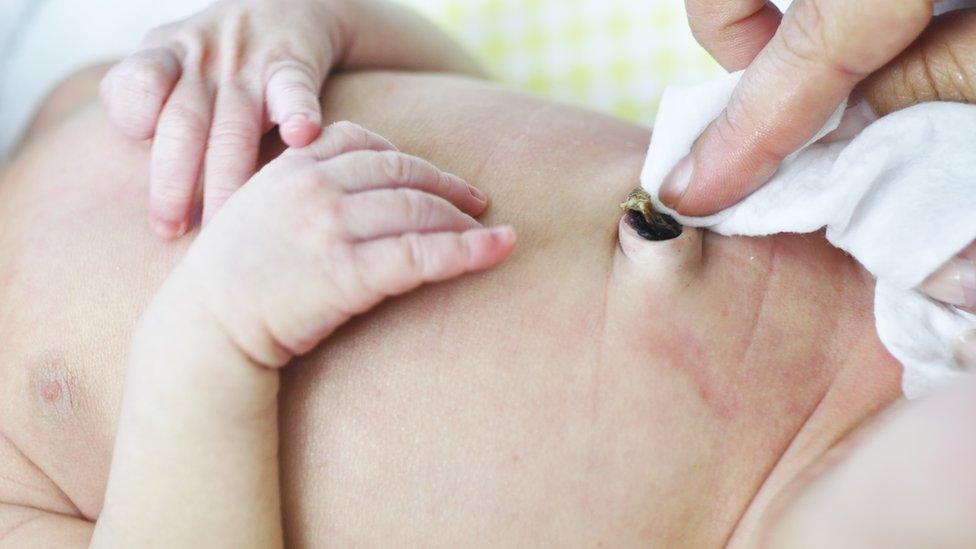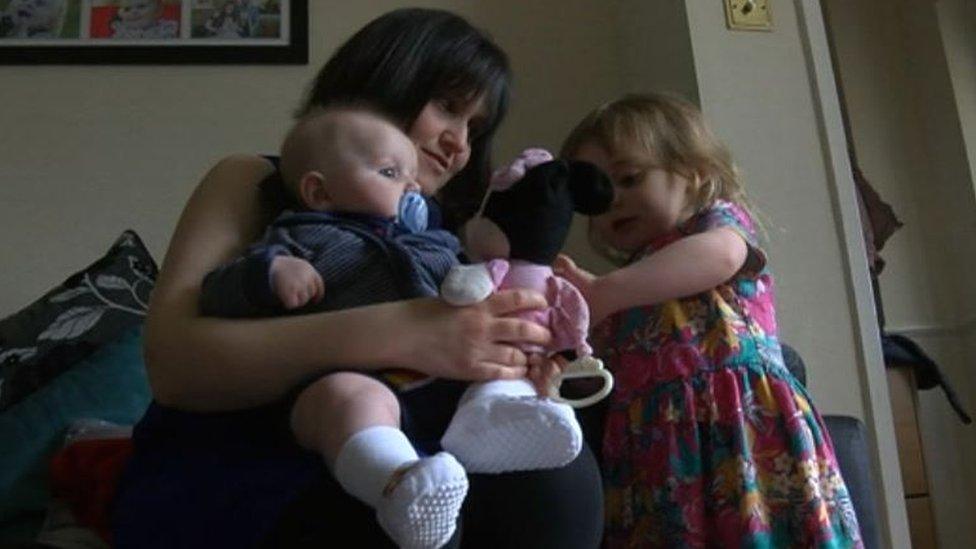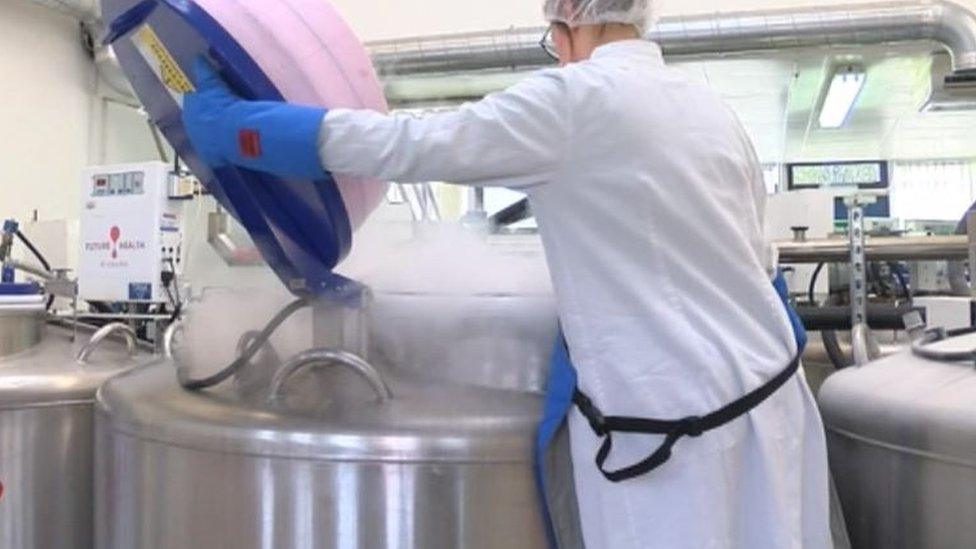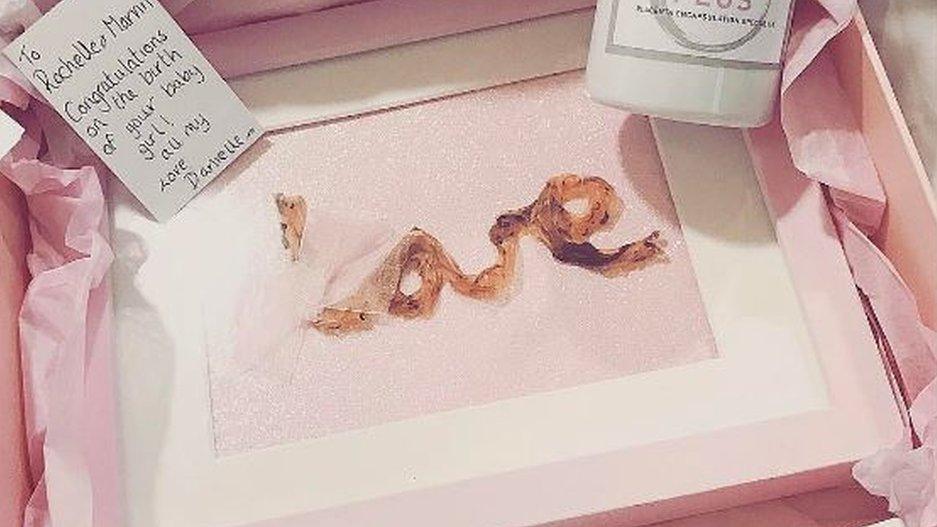Cord blood: Rise in parents paying for private banking
- Published

Normally following the birth of a baby, the placenta and cord blood are discarded, according to routine hospital practice
The number of people paying thousands of pounds to freeze parts of their baby's umbilical cord in case they get ill has risen sharply, figures show.
Cord blood and tissue are rich in stem cells and can be stored with private companies to use to treat the child for a range of life-threatening diseases.
Some 27,028 blood and tissue units were banked privately in 2018 compared with 16,965 units in 2014.
The Royal College of Midwives has previously not backed private banking.
According to regulator the Human Tissue Authority, there are seven private establishments in the UK licensed to process either cord blood or tissue.

'It's an investment in my children's health'

Rosaira Tormey banked her son's cord blood and tissue in December
Mother-of-three Rosaira Tormey, from Sheffield, who has a mutation of the BRCA1 gene, which increases her chances of getting breast cancer, said because of this she paid £2,700 to bank her son's umbilical cord blood and tissue.
Although stem cell treatment cannot currently treat her condition, she said she hoped keeping the cord could one day help her children if they were to get ill.
Ms Tormey, who also pays £100 a year for storage fees, said: "We just saw it as investment in their health.
"I've got no control over whether I've passed a faulty gene to them but I feel like I've got a little bit of control now if something was to happen.
"People save for their kids' weddings and things like that, so why not put something in place if they ever need that protection?"

Mothers can also choose to donate cord blood to the public stem-cell bank, the NHS Cord Blood Bank, or one run by a charity, such as the Anthony Nolan Trust.
These donations are made available for public use and are not kept specifically for individuals.
Private banks differ in that they store units solely for use by the donor or their family in the hope that if one of them becomes ill with a stem cell-treatable disease, such as blood cancer or immunodeficiencies, there might be a perfect match unit available.
Figures from the regulator, obtained by the BBC under the Freedom of Information Act, showed the number of umbilical cord tissue units processed privately almost doubled between 2014 and 2018, rising from 6,289 to 11,950.
There was also an increase in the number of cord blood units processed, going from 10,676 in 2014 to 15,078 in 2018.
While numbers for private storage have risen, donations of cord blood to the public banks dropped from 4,634 in 2014 to 2,573 in 2018.
However, some public banks, including the NHS one, have a lower set collection target and therefore would not expect as many donations.

Cord blood and tissue are stored in liquid nitrogen containers and can be kept for 25 years
In the past, the Royal College of Midwives and the Royal College of Obstetricians and Gynaecologists said they supported public but not private banking.
They said there was not enough evidence to recommend routine private cord collection and banking unless there was a medical reason.
But both bodies said they were currently looking at their position on the issue.
You may also be interested in:
Guy Parkes, head of stem cell donation and transplantation for NHS Blood and Transplant, said: "Public cord blood banking is an altruistic, lifesaving act. Private cord blood donation is completely different to public donation.
"We aim to collect a certain amount of cord blood donations each year because that provides the best way of finding a match for the majority of patients.
"Public support for cord blood donation is very high and we continue to meet our collection targets."
However, Mark Hall, who set up Stem Protect after missing out on banking his son's cells, said private companies were not preying on parents' insecurities.
"Ideally we'd like to see it given away for free and provided for on the NHS," he said.
Mr Hall said he had had clients who had utilised their frozen stem cells.
"It's saddening that they've had to use it in the first place but it's fantastic it has been used and made a major difference to people's lives."
- Published13 March 2017

- Published12 February 2014
